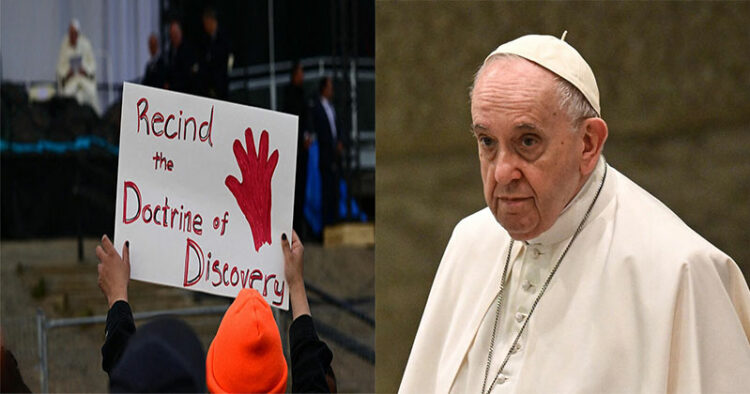Recently, the Vatican responded to Indigenous demands and formally repudiated the “Doctrine of Discovery,” the theories backed by 15th-century “papal bulls” that legitimised the colonial-era seizure of Native lands and form the basis of some property laws today.
The statement, from the Vatican’s development and education offices, marked a historic recognition of the Vatican’s own complicity in colonial-era abuses committed by European powers.
It was issued under history’s first Latin American pontiff, exactly one year after Francis met at the Vatican with Indigenous leaders from Canada who raised the issue. The statement was a response to decades of Indigenous demands for the Vatican to formally rescind the papal bulls that provided backing to spread Christianity through manipulation and brainwashing.
Calls to rescind the Doctrine of Discovery grew louder last year when Pope Francis made a trip to Canada during which he apologised for the Catholic Church’s role in widespread abuses that took place at so-called residential schools.
Between the late 1800s and 1990s, more than 150,000 Inuit, First Nation and Metis children across Canada were taken from their families and communities and obligated to attend the forced-assimilation institutions, which were rife with physical, psychological and sexual violence.
The papal bulls played a key role in the European conquest of Africa and the Americas, and their effects are still felt by Indigenous people.
The doctrine was invoked as a legal and religious standing by Europeans who “discovered” new lands and violently seized it from people who had been living there for generations. It has been cited in different arenas for centuries.
For instance, those decrees underpin the “Doctrine of Discovery,” a legal concept coined in 1823 U.S. Supreme Court decision has come to be understood as meaning that ownership and sovereignty over land passed to Europeans because they “discovered” it. It was also cited as a 2005 Supreme Court decision involving the Oneida Indian Nation written by the late Justice Ruth Bader Ginsburg.
The Church has said it stands with Indigenous peoples now and strongly supports the U.N. Declaration on the Rights of Indigenous Peoples, which it says can help protect Indigenous rights as well as improving living conditions and development “in a way that respects their identity, language and culture.”
The Vatican said it had learned much from dialogue with indigenous groups about their suffering during European colonisation and since, and it asked for pardon for the church’s errors.
The statement also stressed that church leaders had often advocated for indigenous rights, including Pope Paul III, who declared in 1537 that indigenous peoples “are by no means to be deprived of their liberty or the possession of their property, even though they be outside the Christian faith.”
The Vatican acknowledged that papal decrees in the 15th century, which permitted Portugal to subjugate Muslims and other non-Christians in Africa, and divided overseas territories between Portugal and Spain, “did not adequately reflect the equal dignity and rights of indigenous peoples.”
However, the Vatican qualified the church’s responsibility for colonial injustices by saying that the papal decrees “were manipulated for political purposes by competing colonial powers in order to justify immoral acts against indigenous peoples that were carried out, at times, without opposition from ecclesiastical authorities.”
Some are of the view that the Vatican’s nullification was too late to stop the destructive impact of colonialism.
The damage has already been done. They are shirking their responsibility by merely acknowledging the unimaginable sufferings people had to face. It has already entrenched quite deep and adversely affected the social fabrics of the global society today.
On the other hand, some are of the view that this is a historical move from the Church’s side to ultimately realise and reflect on their mistakes.
According to some, the Vatican’s move is welcoming because it has also renounced the whole mindset of cultural superiority, of racial superiority. Completely abandon the existing way of thinking and be an active ally in protecting Indigenous human rights along with all human rights.














Comments